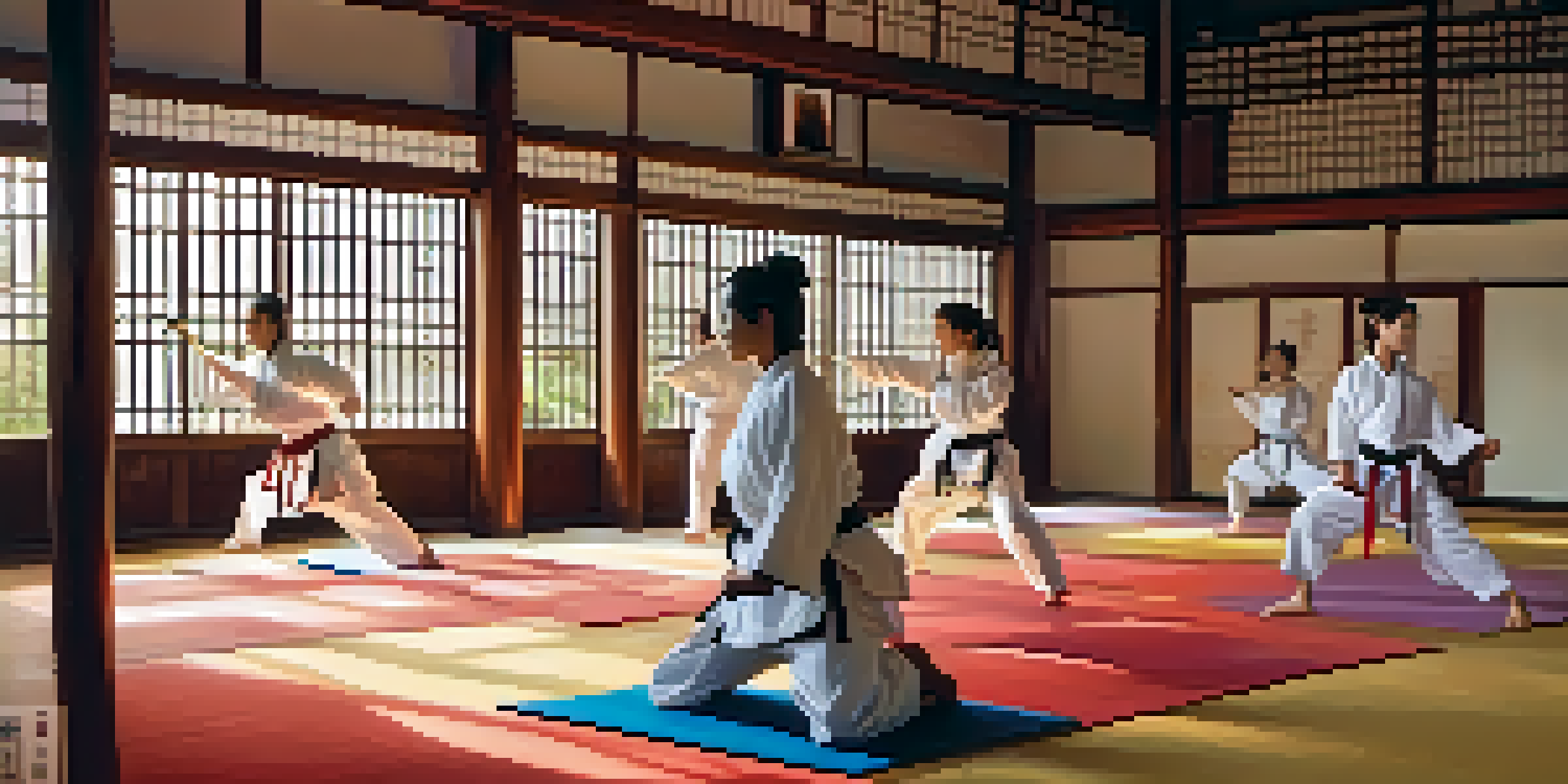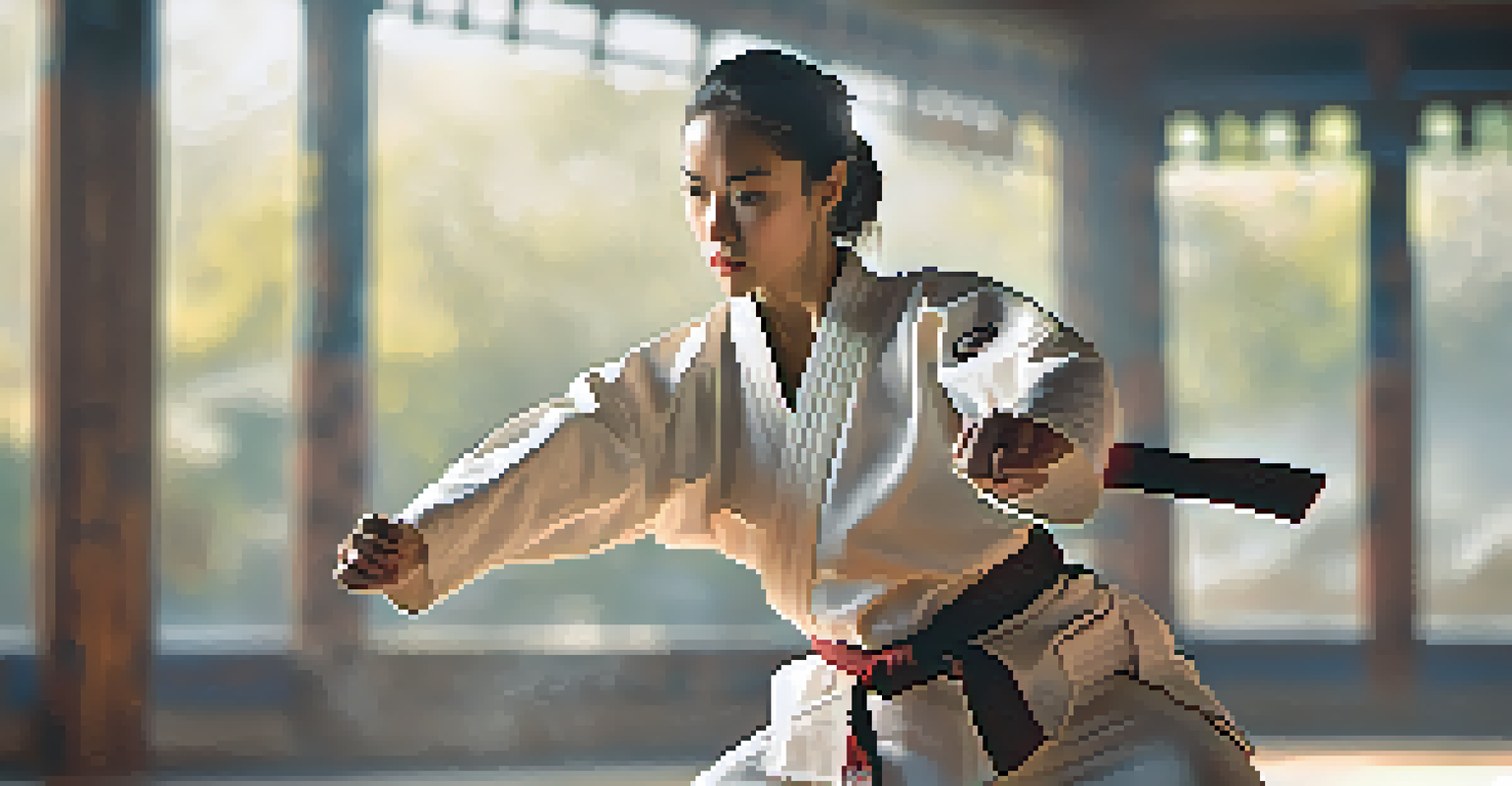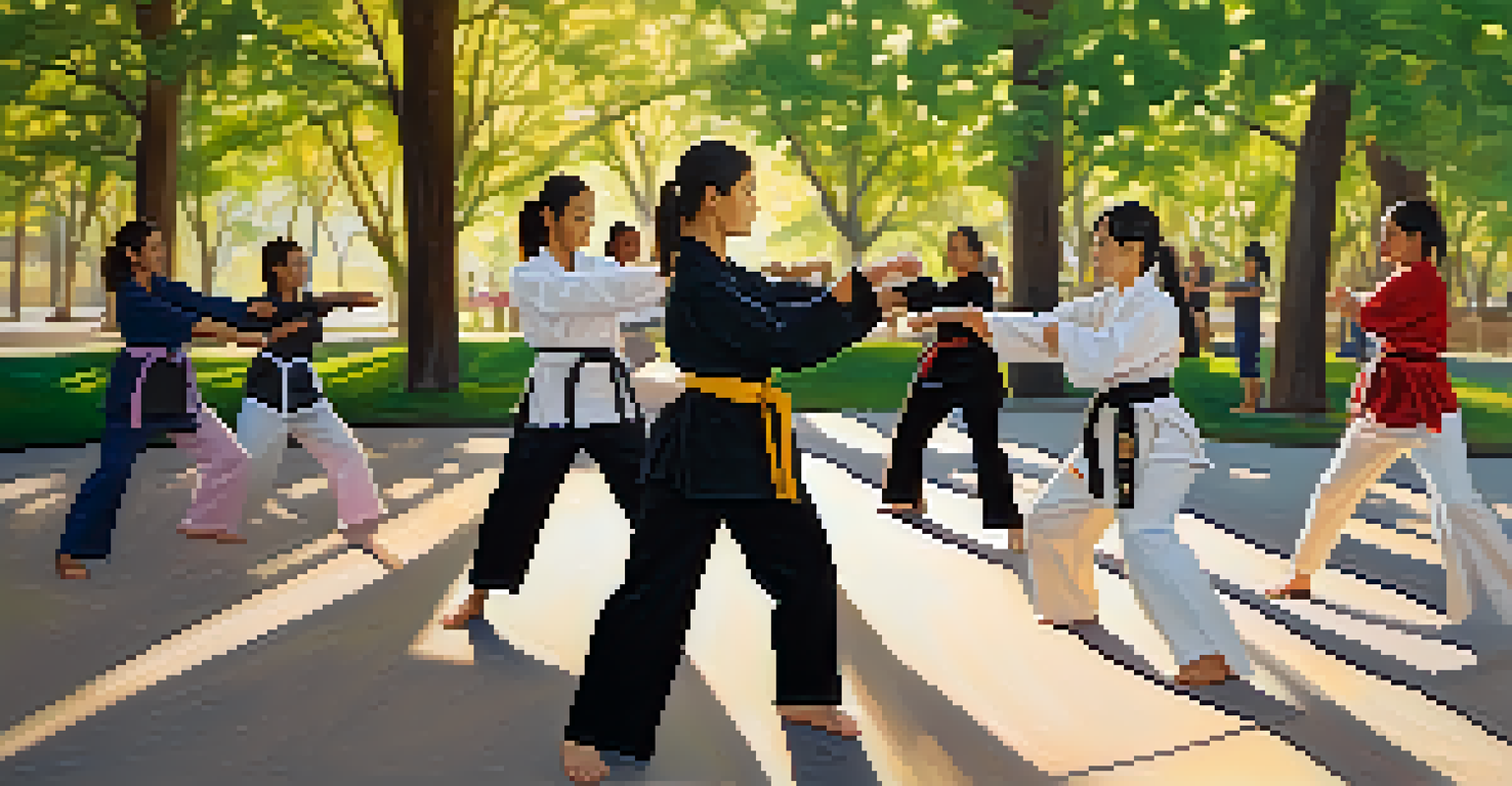The Role of Women in Martial Arts Across Cultures

Historical Perspectives on Women in Martial Arts
Throughout history, women have played significant roles in martial arts across various cultures. For instance, in ancient Greece, female athletes competed in sporting events, including combat sports, highlighting their prowess. Similarly, Japan's samurai culture had women trained in self-defense techniques, showcasing their strength and skill. Understanding these historical contexts helps us appreciate the depth of women's contributions to martial arts.
The future belongs to those who believe in the beauty of their dreams.
As we delve into different cultures, we find that women's involvement in martial arts wasn't merely a modern trend. In places like China, women practiced kung fu for both defense and personal empowerment, often participating in family or community training. This illustrates that martial arts have long served as a means for women to gain independence and confidence in many societies.
By studying the historical roles of women in martial arts, we can see how these practices have evolved. In many cases, women fought against societal norms to carve out their place in these traditionally male-dominated arenas. This rich legacy continues to inspire new generations of female martial artists today.
Cultural Significance of Female Martial Artists
The cultural significance of women in martial arts cannot be overstated. In many societies, female practitioners serve as role models, demonstrating that strength and femininity can coexist. For example, in Brazilian jiu-jitsu, women like Mackenzie Dern have not only excelled in competition but have also become ambassadors for the sport, encouraging other women to participate.

Moreover, martial arts often reflect cultural values regarding gender roles. In some cultures, women's participation in martial arts symbolizes a shift towards greater gender equality. This is particularly evident in countries where women are increasingly breaking barriers in sports and self-defense, challenging traditional perceptions.
Women’s Historical Role in Martial Arts
Throughout history, women have significantly contributed to martial arts, breaking societal norms and establishing their strength across various cultures.
The impact of female martial artists extends beyond their own communities. As they gain recognition, they inspire changes in societal attitudes towards women in sports, fostering environments where girls feel empowered to pursue their interests in martial arts and beyond. This ripple effect enhances the cultural landscape and promotes inclusivity.
Modern Movements: Women in Martial Arts Today
Today, women in martial arts are at the forefront of modern movements advocating for equality and representation. Initiatives such as 'Women’s Empowerment Through Martial Arts' focus on teaching self-defense to women, promoting both physical safety and mental resilience. These programs often create supportive communities where women can bond over shared experiences.
Strength does not come from physical capacity. It comes from an indomitable will.
Social media has played a crucial role in amplifying the voices of female martial artists. Platforms like Instagram and YouTube allow women to showcase their skills, share their journeys, and connect with others worldwide. This visibility not only inspires aspiring martial artists but also fosters a sense of belonging in a traditionally male-dominated space.
Furthermore, the rise of female-led martial arts organizations has led to more opportunities for women in competition and coaching. By creating platforms that prioritize female athletes, these organizations are reshaping the narrative, ensuring that women not only participate but thrive in martial arts.
Challenges Faced by Women in Martial Arts
Despite the progress made, women in martial arts still face various challenges. One significant issue is the prevalence of stereotypes that can undermine their skills and achievements. Many female martial artists encounter skepticism about their abilities, especially in competitive environments where men dominate.
Additionally, the lack of female representation in coaching and leadership positions can limit opportunities for aspiring female martial artists. When women don't see others like them in these roles, it becomes difficult to envision a future for themselves in the sport. This gap highlights the need for mentorship and support systems that empower women to step into leadership roles.
Challenges for Female Martial Artists
Despite progress, women in martial arts face challenges such as stereotypes, lack of representation, and issues of harassment that hinder their participation and growth.
Moreover, issues like harassment and unequal treatment can deter women from pursuing martial arts. It's crucial for schools and organizations to address these concerns actively, creating safe and inclusive environments for all practitioners. By tackling these challenges head-on, the martial arts community can cultivate a more equitable landscape.
Diverse Styles and Their Female Practitioners
Martial arts encompass a wide array of styles, each with unique histories and philosophies. In styles like taekwondo and judo, women have made significant strides, both in competition and in coaching. The Olympic inclusion of these sports has provided a platform for female athletes to shine on a global stage, showcasing their dedication and talent.
Styles such as capoeira, with its vibrant dance-like movements, have also seen a notable female presence. Women in capoeira not only embrace the physical aspects but also contribute to its cultural richness, promoting inclusivity and community. This blending of artistry and combat highlights the multifaceted nature of martial arts for women.
As women continue to explore various martial arts styles, they often bring their unique perspectives and experiences to the practice. This diversity enriches the martial arts community, fostering innovation and collaboration among practitioners. Celebrating these differences helps create a more dynamic and inclusive environment for everyone involved.
The Impact of Female Role Models in Martial Arts
Female role models in martial arts play a pivotal role in inspiring the next generation. Athletes like Ronda Rousey and Michelle Waterson have not only achieved remarkable success but have also paved the way for other women to enter the sport. Their journeys highlight the importance of perseverance and determination, encouraging young girls to chase their dreams, regardless of societal expectations.
These role models also help to break down stereotypes associated with female athletes. By showcasing their strength, skill, and grace, they challenge the notion that women should be relegated to traditional roles. This shift in perception is vital in fostering a culture that celebrates women's achievements in martial arts and sports in general.
Future of Inclusivity in Martial Arts
The future looks promising for women in martial arts as increasing efforts focus on inclusivity and empowerment, reshaping perceptions and creating supportive environments.
Furthermore, female role models often engage in mentorship, providing guidance and support to aspiring martial artists. This nurturing environment fosters personal growth and helps build a sense of community among women in martial arts. As these role models continue to rise, they create a legacy that empowers future generations.
Future Trends: Increasing Inclusivity in Martial Arts
Looking ahead, the future of women in martial arts appears promising with increasing efforts towards inclusivity. Many organizations are actively working to create programs specifically designed for women, focusing on self-defense, fitness, and personal growth. These initiatives not only encourage participation but also foster a sense of empowerment among women.
Moreover, the growing visibility of female martial artists in media and competitions is reshaping perceptions. As more women take center stage, they challenge outdated stereotypes and inspire a new generation to embrace martial arts. This shift is crucial in creating a more diverse and supportive environment for all practitioners.

As we move into the future, it's essential to continue advocating for equality and representation in martial arts. By supporting female athletes, encouraging mentorship, and addressing systemic challenges, we can ensure that the martial arts community remains a place where everyone can thrive, regardless of gender.